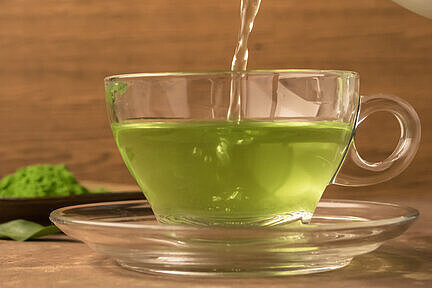Dried green tea

In the ongoing search for healthy supplements to add to our dogs' diets, many dog owners have begun to research the potential benefits of dried green tea. Known for its antioxidant properties in humans, its inclusion in dog diets raises questions about safety and efficacy. In this article, we dive deep into the topic of dried green tea for dogs, examining what it is, its potential benefits and the associated risks.
What is dried green tea?
Dried green tea comes from the leaves of the Camellia sinensis plant, which are minimally oxidized. Unlike black tea, green tea undergoes a process that stops oxidation, preserving many of the plant's natural antioxidants and nutrients. These dried leaves can then be brewed to produce a tea or used in dried form as an ingredient in various products.
Benefits of dried green tea for dogs
Rich in antioxidants
Green tea is known for its high levels of antioxidants, particularly epigallocatechin gallate (EGCG), which fights free radicals and can reduce oxidative damage in the body. These antioxidants can help boost the immune system and reduce the risk of chronic disease.
Supporting oral health
Studies have shown that green tea has antibacterial properties that can help improve oral health. Regular use of green tea can help reduce plaque buildup and keep breath fresh.
Potential weight management support
Some research suggests that the antioxidants and compounds found in green tea may boost metabolism and promote fat burning, which could help with weight management.
Disadvantages and risks
Caffeine content
Green tea contains caffeine, which can be toxic to dogs in large quantities. Caffeine can cause nervousness, palpitations, increased blood pressure and, in severe cases, seizures in dogs.
Tannins and iron absorption
The tannins in green tea can inhibit iron absorption, which can lead to problems, especially in dogs that already suffer from iron deficiency.
Interaction with medication
Green tea can interact with certain medications and interfere with their effectiveness. It is important to speak with a veterinarian before introducing green tea into a dog's diet, especially if the dog is already taking medication.
Enjoy with caution
While dried green tea can offer potential health benefits for dogs, the risks should not be overlooked. The caffeine content alone makes it an ingredient that should only be used in very limited quantities and under careful observation. The decision to include green tea in your dog's diet should always be based on sound information. In small, controlled amounts, dried green tea could be a valuable supplement, but as with anything that affects our dogs' health, caution is advised.
If you notice any signs of hypersensitivity or poisoning in your dog, you should see your vet immediately. We are not a substitute for a vet, but we try to be as accurate as possible. Every dog reacts differently and we recommend you get a second opinion or consult your vet if in doubt.
Stay healthy and take good care of your four-legged friend!😊
Similar to Dried green tea
Valerian tea is made from the roots of the valerian plant (Valeriana officinalis), which is native to Europe and Asia. The roots contain various ingredients that act on the nervous system and have a...
Green tea is an infusion made from the leaves of the Camellia sinensis plant. In contrast to black tea or oolong tea, green tea is not fermented, but only steamed or roasted. This preserves more...
St. John's wort is a perennial plant that is native to Europe, Asia and North Africa. It has yellow flowers that bloom around June 24 (St. John's Day) and green leaves with small oil glands. The...
Lavender tea is a herbal tea made from the dried flowers of the lavender plant (Lavandula angustifolia). Lavender belongs to the labiate family and originally comes from the Mediterranean region....



